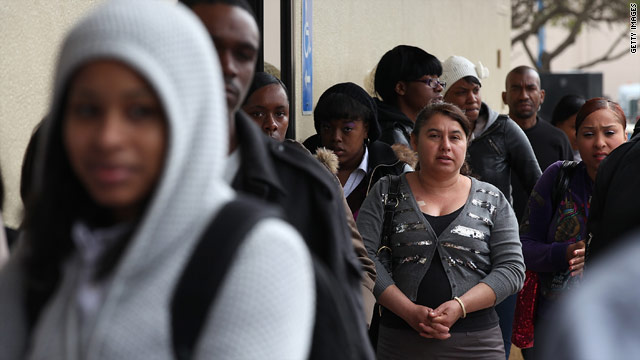
by Dr. Boyce Watkins – YourBlackWorld.com
The first decade of the new millennium brought a lot of things that the world didn't expect: the ability to order a pizza on your home computer, cell phones that allow you to talk to your friends face-to-face, and our nation's first black president.
One other unexpected event of the last decade is the disappearance of a century's worth of progress in reducing the wealth gap between black and white Americans. AsRex Nutting at Market Watch so accurately notes, wealth levels of the black family in America have declined dramatically during the past decade, and they show no evidence of getting better any time soon.
According to Nutting, "In a country where access to capital is everything, most blacks have nothing."
First, Nutting mentions that African Americans have the highest unemployment rates in the country, which stand at an average of 16.5%, compared to 9% for whites. What is most daunting is that soaring black joblessness, combined with higher foreclosure rates, bankruptcies, and declining home values have seriously cut into the wealth of the black family in America. in other words, we are the first to lose our jobs, have the least wealth to protect our families when times are tough, and a greater reliance on declining home equity as a source of economic security. This economy has provided the perfect storm of black economic destruction.
According to Nutting, the median net worth for black households dropped from $9,300 in 2007 to $2,200 in 2009, much lower than the median wealth of $98,000 for white households. He also mentions that incomes dropped in black homes by 7.2% between 2007 and 2009, much greater than the 4.2% decline for white families.
Nutting's article reminds us that the United States has a long way to go when it comes to wealth distribution. Over 80% of the nation's wealth is controlled by just 20% of its citizens, and the richest 1% of Americans controls one-third of the nation's wealth. Roughly 40% of Americans have no wealth at all. African Americans are disproportionately represented in the group of Americans with zero or negative wealth, which is a problem that most of our elected officials are inclined to ignore, and something that our nation's citizens don't spend much time getting upset about.
Nutting is correct to mention that most Americans have their wealth tied up in their home values. So, when home prices dropped so dramatically during the economic downturn, this led to the wealth of many black families disappearing as quickly as it had arrived. Most of the economic disparities in the United States don't exist because whites are more responsible with their money or possess economic intelligence that black people don't have. The primary reason for the gap is that for hundreds of years, African Americans added to our nation's net worth, but were not being properly compensated for it (similar to how the NCAA operates). Being left out of the growth of America's economic engine has kept African Americans at the bottom of the ladder of institutional opportunity: Our school systems are not well-funded, we can't find jobs because we don't own the businesses that take applications, and we continue to be utilized as for-profit commodities by the prison industrial complex.
According to Nutting's research regarding the Survey of Consumer Finances, black families were three times wealthier (in real terms) in 1983 than they were in 2009. As white families saw their net worth grow from $124,000 in 2001 to $143,600 in 2007, blacks actually saw their net worth drop from $12,500 to $9,300. By 2009, white families saw their wealth levels drop to $94,600, but African Americans's levels dropped even more to $2,200. So, between 2001 and 2009, African American families went from having a disgraceful one-tenth of the wealth of white families to an even more horrific ratio of one-fiftieth.
I am not sure how to process the Obama Administration's blind, deaf and dumb response to the persistent wealth and opportunity gaps in America that pertain to race. While the president continues to be popular among African Americans, I would encourage members of his administration to remember that leading with courage is an important part of making African American history (not just holding a fancy title that adds almost nothing more than symbolic value for the black community at large). Courage means sometimes doing things that are not popular and working to make America better.
Given that I haven't heard the president or his team use the words "black man," "black woman," or "black families" in public over the last two years, I am concerned as to whether or not our first black president has been or is willing to do much to fight on issues that matter to black people who didn't go to Harvard University. For example, it's interesting that President Obama would speak up for Henry Louis Gates in a meaningless and ambiguous scuffle with a police officer, but wouldn't say a word about Kelley Williams-Bolar, a black woman who was sent to jail for trying to get her kids into a good school. The latter case was far more significant in the fight against inequality, but Kelley's housing projects were apparently not close enough to Harvard Yard.
There is the added complication that perhaps, because of being a black man, President Obama could "get in trouble" with white voters for advocating on issues that matter to African Americans. This argument has been used by supporters of Hillary Clinton, who might be far less sheepish or self-conscious about advocating for women and minorities. I'm not sure if the Clinton supporters are correct, but the last two years have made many African American families wonder if it even matters who sits in the White House.














